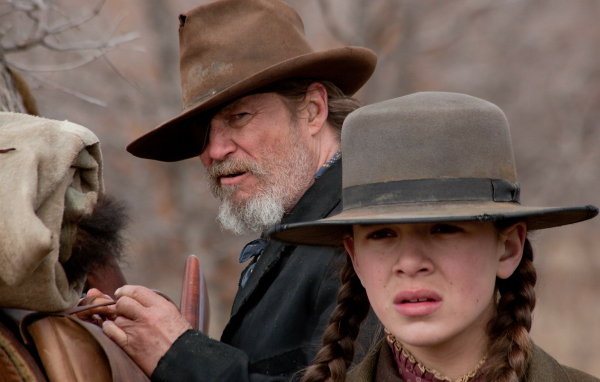Movie review by Greg Carlson
Feature film newcomer Hailee Steinfeld holds the screen with veterans Jeff Bridges, Matt Damon, and Josh Brolin in Joel and Ethan Coen’s remake of “True Grit,” a sturdy piece of genre moviemaking quick to remind viewers of the enduring appeal of the Western film. Henry Hathaway’s 1969 adaptation of Charles Portis’s novel contained plenty of humor, but the Coens specialize in absurd observations honed to a razor’s edge. The filmmakers’ gift for shaping a universe from the syntactically stylized patois of its denizens has not seen this kind of workout since the invented gangland slang of “Miller’s Crossing.” Much of the dialogue is pulled directly from Portis, who imagines 1870s oral communication as the poetic “prairie Shakespeare” familiar to fans of David Milch’s brilliant “Deadwood.”
Familiar to scores of fans, “True Grit” traces the quest of fourteen-year-old Mattie Ross (Steinfeld) to find the killer of her father. Enlisting the help of a salty alcoholic, and soon joining forces with a proud, mustachioed Texas Ranger, Mattie’s horseback odyssey – and her own “sand” in the face of hardship and violence – defies the expectations of the older men en route to the creation of a thoroughly engaging Bildungsroman. The Coens have noted their admiration for Charles Laughton’s “The Night of the Hunter,” another kid’s-eye-view tale smoldering with the gothic, and the newer film’s inclusion of the hymn “Leaning on the Everlasting Arms” as an aural motif is one of several tributes to the 1955 thriller.
In a film predicated on the transactional, the Coens hold up their end of the bargain, remaking “True Grit” with all the grace notes of their signature brand of funny-bone fatalism (which runs parallel with the tremendously satisfying dialogue originally crafted by Portis). Entrepreneurial commerce, a familiar theme in the American Western, brightens the eyes of more than half the film’s characters, and many conversations hinge on negotiations related to buying, selling, or trading everything from room and board to bounty hunting services to corpses. Alongside Mattie’s literal righteous indignation at the already overburdened justice system’s unwillingness to apprehend her father’s murderer, the Coens take obvious pleasure in the ongoing hustles, haggles, and barters taken up by Mattie and just about everyone else.
Jeff Bridges, more versatile if less iconic than John Wayne, makes a terrific “one-eyed fat man” as he tries on the role that brought the Duke his only Oscar. As United States Deputy Marshal Reuben J. “Rooster” Cogburn, the trigger-happy lawman who likes to “pull the cork,” Bridges gleefully mush-mouths his dialogue to the brink of incomprehensibility. Like Wayne’s Rooster, Bridges embodies a sense of joy and merriment in the execution of his often dangerous trade. Although Mr. Cogburn’s reputation as a killer contrasts with Jeff “The Dude” Lebowski’s live-and-let-live passivity, both characters share the quintessentially Western idealism that privileges individual freedom over the restrictions of settled society.
While the Coen version is superior to the original in many significant ways, especially in maintaining Mattie’s point-of-view, a post-denouement coda depicting the heroine twenty-five years following the action distracts from the potency of Steinfeld’s work by catapulting Mattie into adulthood. Hathaway’s version, which concludes with Mattie’s touching offer to inter Rooster in her family plot (and Rooster’s comic rejoinder that he isn’t interested in moving in any time soon) preserves the character – who would appear in a 1975 sequel and resurface in a 1978 TV movie featuring Warren Oates in the role – without mourning, fossilizing or deifying him. While the Coen edition sticks closer to Portis’s story, it’s more satisfying to imagine Rooster alive, reins in his teeth, and guns ablaze.
